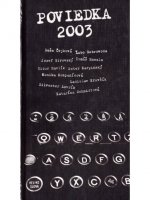
Levice, Koloman Kertész Bagala,
L.C.A. Publishers Group 2003
The award-winning short stories of the seventh annual short-story competition Poviedka are a rich mixture of ministories or reflections. The good news is the decreasing number of entrants submitting stories of big words saying little in sophisticated, yet totally incomprehensible arrangements.
In the opener, entitled Jativ amod by Daša Čejková, the main character, tired of urban life and the impossibility of helping others, seeks refuge in rural environment. There she collects new experience, only to see that the new environment is even less suited to her needs, yet she remains there, unwilling to abandon her now steady companions of fear and anxiety. The author seems all too worried about making her point, thus engaging in excessive and avoidable descriptions. Also, the central motive of lacking understanding is presented too straightforwardly, although, overall, her idea of seeking refuge as a shelter from deluding reality is an interesting one. Lubo Dobrovoda in his Muchotrávka (Toadstool) connects a variety of childhood recollections, using the child’s point of view of short sentences and intertwining time levels associated with merely external perceptions. In a similar vein, Katarína Schmidtová in her Rudbekia srstnatá goes deeper in capturing a child’s efforts to win motherly love at any cost. Tomáš Hasala in his Návrat strateného syna (The Return of a Lost Son) stands out through his peculiar formal ways – a good half of the text is made of footnotes, with the author complementing the actual text. In fact, this proves to be quite helpful in highlighting the basic conflict between our perceptions and the unperceived. Tibor Havlík’s Futbalista (The Football Player) reads more like a story puzzle than an actual story, with all details hovering atound the football fan Otto; the story is rather chiseled, self-aware of the fictional process at work and supported by repeated use of the conditional and reiterating the mother motive.
Peter Karpinský in his Keď pôjdem cez údolie (Walking Through The Valley) affords what seems to be a look into the hospital rooms, yet the overabundance of characters seems to have disallowed him going into more depth. Hence, poetical passages descriptive of the natural surroundings have more merit than his dialogues. A view from the outside and several human fates are afforded also by Silvester Lavrík’s Šólet, while the author tries to collect as much information as possible only to interrupt this information flow by a dialogue or a prophetic warning of something important happening. His seems to be the most dynamic contribution; its tragic end mitigated by the encounter of characters whose now dead children have given them one more chance of sustaining partnership. An opposite tendency is observed in the competition winner, Zmok (Household Demon) by Jozef Girovský. Here, the motive from popular folk tales and superstitions about a household demon is used to convey human aggression of an increasing intensity, while the malicious joy of seeing others suffer bluntly overpowers any flashes of sympathy. Ladislav Kravčík in his O človeku, ktorý sa vrátil (The Home Comer) fragments the main motive of a dead man returning by adding new stories of other characters. Their connections to the dead man are limited to their conversations about this mysterious creature with a single repetitive question. In contrast, the story entitled with a boy’s name, Slávko by Monika Kompaníková, is very much a “rural postcard“ – an uncomplicated rendition of life lived “in the middle of nowhere”, which, nonetheless, can charm a delicate and spoilt urban soul that has long forgotten about the simple things.
Overall, even though some short stories, or rather parts thereof, are worth reading and the ideas behind the stories are very interesting, I cannot help feeling that the stringencies of composition are beyond the author’s powers. While fragmented story-telling and brewing wild mixtures might be intentional, the absence of intelligent humor, irony and self-irony, which was on the ’weak points list’ of the juror Daniela Kapitáňová, can hardly be justified as an intention.
Adela Gabríková